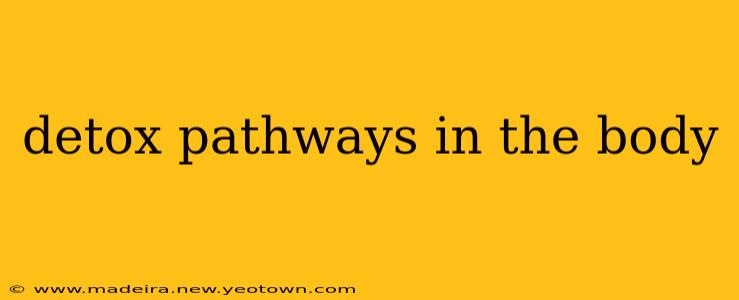We often hear about "detoxing," but what does it actually mean for our bodies? It's not some mystical process; it's a constant, ongoing function, a vital part of staying healthy. Our bodies are remarkably efficient at eliminating toxins – naturally! Let's explore the fascinating pathways our bodies use to keep us clean and functioning optimally.
This isn't about trendy juice cleanses or expensive supplements. This is about understanding the incredible, built-in detoxification system you already possess. Think of it as a well-oiled machine, working tirelessly day and night. Let's delve into the specifics.
What are the main organs involved in detoxification?
Our detoxification system isn't a single organ; it's a coordinated network. Key players include:
-
Liver: This powerhouse is the primary detoxification organ. It processes and neutralizes many toxins, transforming them into less harmful substances that can be easily excreted. Imagine the liver as a highly sophisticated filtration system, tirelessly working to cleanse your blood. It handles everything from alcohol and medications to environmental pollutants.
-
Kidneys: These amazing organs filter waste products from the blood, creating urine to eliminate them from the body. They play a vital role in managing fluid balance and removing excess salts and minerals.
-
Lungs: Our lungs are constantly at work, expelling carbon dioxide – a waste product of metabolism – and other volatile compounds through exhalation. Think of it as your body's natural exhaust system.
-
Skin: Sweating is a crucial detox pathway. Sweat glands help eliminate toxins through perspiration, playing a smaller but still significant role in overall detoxification.
-
Intestines: The digestive system plays a role in eliminating toxins through waste elimination. The gut microbiome – the vast community of bacteria in your gut – is crucial in this process, helping break down and neutralize harmful substances.
How does the liver detoxify the body?
The liver uses a multi-step process to detoxify the body:
-
Phase 1: This stage involves breaking down toxins into more water-soluble forms. Enzymes play a key role in this process, altering the structure of the toxin to prepare it for removal.
-
Phase 2: Once the toxin is altered, this stage involves conjugation – attaching another molecule to make it even more water-soluble and easier to eliminate through the urine or bile.
What are some ways to support the body's natural detoxification processes?
While our bodies are remarkably efficient at detoxifying themselves, supporting these natural processes can be beneficial:
-
Hydration: Drinking plenty of water is crucial. Water helps flush out toxins through urine and sweat.
-
Nutritious Diet: Focus on whole foods, including fruits, vegetables, and lean proteins. These provide essential nutrients that support liver and kidney function.
-
Fiber: Fiber is essential for healthy bowel movements, promoting the elimination of waste products.
-
Reduce Exposure to Toxins: Limit exposure to environmental pollutants, avoid excessive alcohol consumption, and choose personal care products carefully, opting for natural alternatives.
-
Adequate Sleep: Sleep deprivation can negatively impact detoxification processes. Prioritize getting enough restful sleep.
-
Manage Stress: Chronic stress can negatively affect the body's ability to detoxify effectively. Incorporate stress-reducing techniques like meditation, yoga, or spending time in nature.
Are detox diets and cleanses necessary?
While supporting the body's natural detoxification pathways is important, there's little scientific evidence to support the effectiveness of "detox diets" or cleanses. Your body is already remarkably equipped to handle this process. These fad diets often lack nutritional value and can even be harmful. Instead, focus on adopting healthy lifestyle habits that support your body's natural detoxification mechanisms.
What are some signs of impaired detoxification?
If your body's detoxification pathways are overwhelmed, you might experience symptoms such as fatigue, headaches, skin problems, digestive issues, or a weakened immune system. If you're concerned, consult a healthcare professional.
How can I improve my liver health for better detoxification?
Supporting liver health is key to supporting detoxification. A healthy diet, regular exercise, and avoiding excessive alcohol consumption are crucial. Furthermore, adequate hydration and managing stress levels play a vital role in maintaining optimal liver function.
This journey into the world of detoxification reveals the amazing capabilities of the human body. It’s not about quick fixes, but rather about consistently nurturing your body’s natural cleansing power. By focusing on healthy lifestyle choices, you can support your body's natural detoxification processes and enjoy optimal health and well-being. Remember, your body is a marvel of engineering, already equipped with everything it needs to stay clean and healthy!

